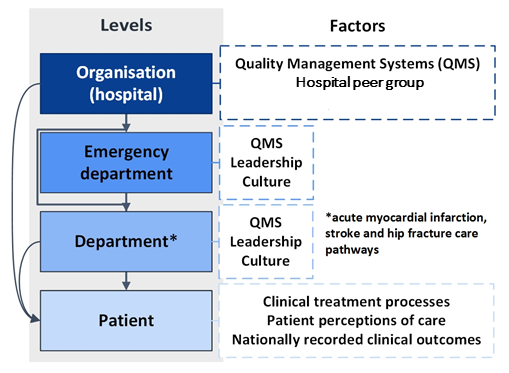DUQuA
Deepening our Understanding of Quality in Australia

Project members - Macquarie University
Professor Jeffrey Braithwaite – Professor and Director
Associate Professor Robyn Clay-Williams – Associate Professor
Dr Gaston Arnolda – Senior Research Fellow
Ms Chrissy Clay – Research Outreach Coordinator
Project Contact: duqua@mq.edu.au
Project main description
Deepening our Understanding of Quality in Australia (DUQuA) is an Australia-wide, NHMRC funded research project that focuses on the quality of care in Australian hospitals. It was conducted in 32 large public hospitals around Australia during the period mid-2014 to mid-2019. These hospitals had 119 participating departments, and 2,387 participants, including clinicians (doctors, nurses, and allied health professionals), hospital managers, and patients.
DUQuA aimed to identify how hospital quality management systems, leadership and culture in Australian hospitals are related to healthcare delivery quality and patient factors. It extends the work undertaken in the ‘Deepening our Understanding of Quality improvement in Europe’ (DUQuE) study, which examined the relationships between quality management systems, clinical processes, and patient factors in 188 hospitals across seven European countries.
DUQuA is led by Professor Jeffrey Braithwaite of the Australian Institute of Health Innovation (AIHI), Macquarie University in collaboration with large public hospitals across Australia. The protocol paper was published in BMJ Open http://bmjopen.bmj.com/content/5/12/e010349.full
Results
The full results will be published in articles for international peer-reviewed journals, in individual reports to participating hospitals and at international conferences and symposiums.
- The International Journal for Quality in Health Care DUQuA Supplement was published 5 February 2020 and is available online. If you or your institution does not have access to this website, please contact us to request a copy aihi@mq.edu.au
- This factsheet outlines the key learning from our International Journal for Quality in Health Care DUQuA Supplement.
- An Introduction to DUQuA presentation is available here.
- Each participating hospital received a confidential benchmarking report in October 2019.
Aims
We aimed to answer two primary research questions, depicted in Figure 1.
- What department level factors are associated with processes and outcomes for stroke, acute myocardial infarction (AMI), and hip fracture patients?
- What hospital level factors (including Emergency Department factors) are associated with processes and outcomes for stroke, AMI, and hip fracture patients?

Figure 1. Relationships to be investigated in DUQuA
Data collection and analysis
This multi-level study involved data collection at four levels: organisation; Emergency Department (ED); care pathway department for AMI, stroke and hip fracture; and patient levels for each hospital.
Data for this study pertains to the period September 2014 to November 2017, with most of the data collected between February and August 2017.
Data collection consisted of quality management, clinician and patient questionnaires; and quality management systems and clinical audits undertaken by experienced External Quality Assessors during a two-day, on-site visit.
Data was summarised using descriptive statistics and analysed using linear mixed models.
Data processing and analysis was extremely complex and took over 18 months to complete. This report benchmarks key features of quality that affect the delivery of care and patient outcomes for each hospital against the DUQuA national sample.
Ethics
Ethical approval has been granted in NSW, VIC, QLD, ACT, TAS, SA and NT.
External project member
- Associate Professor Natalie Taylor, Senior Research Fellow, Cancer Institute NSW, and Visiting Fellow, Macquarie University
- Ms Teresa Winata
- Ms Pei Ting, Biostatistician
Publications
DUQuA publications
- Braithwaite J, Clay-Williams R, Taylor N, Ting HP, Winata T, Arnolda G, Suñol R, Gröne O, Wagner C, Klazinga NS, Donaldson L, Dowton SB. (2020) Bending the quality curve. International Journal for Quality in Health Care. 32(Supplement 1):1-7.
- Braithwaite J, Clay-Williams R, Taylor N, Ting HP, Winata T, Hogden E, Li Z, Selwood A, Warwick M, Hibbert P, Arnolda G. (2020) Deepening our Understanding of Quality in Australia (DUQuA): An overview of a nation-wide, multi-level analysis of relationships between quality management systems and patient factors in 32 hospitals. International Journal for Quality in Health Care. 32(Supplement 1):8-21.
- Clay-Williams R, Taylor N, Winata T, Ting HP, Arnolda G, Braithwaite J. (2020) Organisation quality systems and department-level strategies: refinement of the DUQuA organisation and department-level scales. International Journal for Quality in Health Care. 32(Supplement 1):22-34.
- Taylor N, Clay-Williams R, Ting HP, Arnolda G, Winata T, Hogden E, Braithwaite J. (2020) Do organisation-level quality management systems influence department-level quality? A cross-sectional study across 32 large hospitals in Australia. International Journal for Quality in Health Care. 32(Supplement 1):35-42.
- Clay-Williams R, Taylor N, Ting HP, Winata T, Arnolda G, Austin E, Braithwaite J. (2020) The relationships between quality management systems, safety culture and leadership, and patient outcomes in Australian Emergency Departments. International Journal for Quality in Health Care. 32(Supplement 1):43-51.
- Clay-Williams R, Taylor N, Ting HP, Winata T, Arnolda G, Braithwaite J. (2020) The clinician safety culture and leadership questionnaire: refinement and validation in Australian public hospitals. International Journal for Quality in Health Care. 32(Supplement 1):52-59.
- Clay-Williams R, Taylor N, Ting HP, Arnolda G, Winata T, Braithwaite J. (2020) Do quality management systems influence clinical safety culture and leadership? A study in 32 Australian hospitals. International Journal for Quality in Health Care. 32(Supplement 1):60-66.
- Taylor N, Clay-Williams R, Ting HP, Winata T, Arnolda G, Hogden E, Lawton R, Braithwaite J. (2020) Validation of the Patient Measure of Safety (PMOS) questionnaire in Australian public hospitals. International Journal for Quality in Health Care. 32(Supplement 1):67-74.
- Arnolda G, Winata T, Ting HP, Clay-Williams R, Taylor N, Tran Y, Braithwaite J. (2020) Implementation and data-related challenges in the DUQuA study: Implications for large-scale cross-sectional research. International Journal for Quality in Health Care. 32(Supplement 1):75-83.
- Hibbert P, Saeed F, Taylor N, Clay-Williams R, Winata T, Clay C, Hussein W, Braithwaite J. (2020) Can benchmarking Australian hospitals for quality identify and improve high and low performers? Disseminating research findings to hospitals. International Journal for Quality in Health Care. 32(Supplement 1):84-88.
- Winata T, Clay-Williams R, Taylor N, Hogden E, Hibbert P, Austin E, Braithwaite J. (2020) Using accreditation surveyors to conduct health services research: a qualitative, comparative study in Australia. International Journal for Quality in Health Care. 32(Supplement 1):89-98.
- Braithwaite J, Taylor N, Clay-Williams R, Ting HP, Arnolda G. (2020) Conclusion: The road ahead – where should we go now to improve healthcare quality in acute settings?. International Journal for Quality in Health Care. 32(Supplement 1):99-103.
- Taylor N, Clay-Williams R, Hogden E, Pye V, Li Z, Groene O, Suñol R, Braithwaite J. Deepening our Understanding of Quality in Australia (DUQuA): a study protocol for a nationwide, multilevel analysis of relationships between hospital quality management systems and patient factors. BMJ Open 2015;5:e010349. doi:10.1136/bmjopen-2015-010349.
- Taylor N, Clay-Williams R, Hogden E, Li Z, Lawton R, Braithwaite J. The older, vulnerable patient view: a pilot and feasibility study of the Patient Measure of Safety (PMOS) with patients in Australia. BMJ Open 6:e011069. doi: 10.1136/bmjopen-2016-011069.
- Clay-Williams R, Taylor N, Braithwaite J. Multi-centre health services research governance: potential solutions to the burden of regulation and bureaucracy. Medical Journal of Australia, 2018;208 (4):152-154.
General publications
- Taylor N, Clay-Williams R, Hogden E, Braithwaite J, Groene O. High performing hospitals: a qualitative systematic review of associated factors and practical strategies for improvement. BMC Health Services Research 2015; 15: 244.
- Braithwaite J, Herkes J, Ludlow K, Testa L, Lamprell G. Association between organisational and workplace cultures, and patient outcomes: systematic review. BMJ Open 2017; 7: e017708.
- Campione J, Famolaro T. Promising practices for improving hospital patient safety culture. Joint Commission Journal on Quality and Patient Safety 2018; 44: 23-32.
- Dickinson H, Ham C, Snelling I, Spurgeon P. Are we there yet? Models of medical leadership and their effectiveness: an exploratory study. NIHR Service Delivery and Organisation Programme; 2013.
- Sexton JB, Helmreich RL, Neilands TB, Rowan K, Vella K, Boyden J, et al. The Safety Attitudes Questionnaire: psychometric properties, benchmarking data, and emerging research. BMC Health Services Research 2006; 6: 44.
- Shipton H, Armstrong C, West M, Dawson J. The impact of leadership and quality climate on hospital performance. International Journal for Quality in Health Care 2008; 20: 439-45.
- Chew DP, Scott IA, Cullen L, French JK, Briffa TG, Tideman PA, et al. National Heart Foundation of Australia and Cardiac Society of Australia and New Zealand: Australian clinical guidelines for the management of acute coronary syndromes 2016. Medical Journal of Australia 2016; 205: 128-33.
- Australian and New Zealand Hip Fracture Registry (ANZHFR) Steering Group. Australian and New Zealand Guideline for Hip Fracture Care: Improving Outcomes in Hip Fracture Management of Adults. Sydney: Australian and New Zealand Hip Fracture Registry Steering Group; 2014.
- Stroke Foundation. Clinical Guidelines for Stroke Management 2017. Melbourne Australia. Available at: https://informme.org.au/Guidelines/Clinical-Guidelines-for-Stroke-Management-2017 (accessed 30 July 2019)
Conference presentations
The DUQuA project and/or findings have been presented at the following international and national conferences:
- ISQua 2019; 36th Conference of International Society for Quality in Health Care, Cape Town, South Africa 20-23 October.
- ISQua 2018; 35th Conference of International Society for Quality in Health Care, Kuala Lumpur, Malaysia 23-26 September.
- Royal Australasian College of Medical Administrators conference 2017, Melbourne, Australia, 19-20 October.
- ISQua 2016; 33nd Conference of International Society for Quality in Health Care, Tokyo, Japan, 16-19 October
- Royal Australasian College of Medical Administrators conference 2016, Brisbane, Australia, 13-14 October.
- NHMRC Symposium on Research Translation 2016, Melbourne, Australia, 23 November.
- ISQua 2015; 32nd Conference of International Society for Quality in Health Care, Doha, Qatar, 4-7 October
- 7th International Shared Decision Making (ISDM) Conference and the 4th International Society for Evidence-Based Health Care (ISEHC) Conference, Sydney, Australia, 19-22 July.
Collaborative partners
This large-scale study involves collaboration with various organisations, including:
- Deepening our Understanding of Quality in Europe consortium
- National Stroke Foundation
- Australian and New Zealand Hip Fracture Registry
- The Australian Council on Healthcare Standards
- Australian Commission on Safety and Quality in Health Care
- The Royal Australasian College of Medical Administrators
- Australasian College for Emergency Medicine
Project status
Current
Centres related to this project
Content owner: Australian Institute of Health Innovation Last updated: 11 Mar 2024 5:40pm
